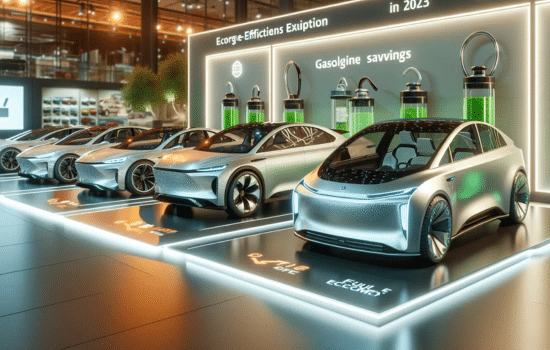Advertisements
Exploring vehicle options that offer high fuel efficiency has become essential in a world where sustainability and savings are increasingly important.
Eco-friendly cars not only help reduce our carbon footprint, but they also provide significant relief to our wallets by reducing gasoline expenses.
Advertisements
This selection of the 10 most fuel-efficient cars reveals models that combine advanced technology, innovative design and a genuine commitment to the environment.
In this in-depth analysis, we examine a variety of factors that make these vehicles stand out. From hybrid engines to advanced electrical systems, each car offers a unique combination of features that maximizes mileage per gallon, without sacrificing comfort or performance.
In addition to fuel efficiency, aspects such as maintenance cost, parts availability and environmental impact are also evaluated, offering a complete overview of each option.
Advertisements
These vehicles not only represent a smart investment for the future, but are also a reflection of how the automotive industry is evolving towards more sustainable solutions.
See also:
- The 10 kings of efficiency
- Maximize your battery life!
- Become an expert in Judo!
- Save money while taking care of the environment
- Read in the palm of your hand
With each model, the advantages and benefits that each one brings are highlighted, helping consumers make informed decisions that not only benefit their personal economy, but also support a cleaner planet.
Get ready to discover cars that redefine the concept of efficiency, while transforming the way we move around on a daily basis.
Hybrid vehicles: a step forward in efficiency
Hybrid cars have revolutionized the automotive industry over the past decade. These vehicles combine an internal combustion engine with one or more electric motors, allowing for significant savings in fuel consumption.
Among the most notable is the Toyota Prius, a pioneer in this category. Its hybrid propulsion system makes it possible to optimize the use of gasoline, especially in urban environments where frequent stops take advantage of energy regeneration.
The Honda Insight is also presented as an affordable and efficient option. This model combines an aerodynamic design with a hybrid engine that maximizes energy efficiency.
Its regenerative braking technology is particularly effective at recharging the battery, contributing to lower fuel usage.
In short, hybrids offer an ideal solution for those looking to reduce their carbon footprint without sacrificing performance.
The rise of electric cars: efficiency at its best
As technology advances, electric cars have gained popularity due to their unparalleled efficiency. Models like the Tesla Model 3 are a clear example of how technology can transform the industry.
Not only is this car energy efficient, it also offers impressive performance, with quick acceleration and an extensive driving range.
The absence of an internal combustion engine eliminates the consumption of fossil fuels, which translates into significant savings.
On the other hand, the Nissan Leaf has been a consistent leader in the electric vehicle market. This model has proven to be a reliable and affordable option, with good range and an efficient charging system.
The use of renewable energy to recharge these vehicles is a growing trend, underlining their potential for long-term sustainable mobility.
Microcars: efficiency in a compact size
Microcars have become a growing trend, especially in urban areas where space is limited. Models such as the Smart Fortwo stand out for their ability to move in tight spaces and their fuel efficiency.
Although small in size, these vehicles are designed to offer comfort and functionality, making them ideal for urban traffic.
Another notable example is the Fiat 500, which combines style and efficiency. This microcar is not only visually appealing, but also offers excellent performance in terms of fuel economy.
Its compact design makes it perfect for manoeuvring in narrow streets, while its efficient engine ensures that fuel costs are kept to a minimum. All in all, microcars represent a practical option for everyday mobility.
Diesel vehicles: a traditional approach with modern improvements
Diesel vehicles have long been the preferred choice for those seeking fuel efficiency.
Although they have faced criticism for their emissions in the past, technological advances have significantly improved their environmental performance.
Models such as the Volkswagen Golf TDI have demonstrated that it is possible to combine fuel efficiency with low emissions.
The BMW 328d is also another example of how modern diesel engines can be both efficient and environmentally friendly.
This vehicle offers outstanding performance on the road, with fuel consumption that surprises even the most demanding drivers.
With selective catalytic reduction systems, these cars minimise emissions, ensuring that diesel use remains a viable option for the future.
Hybrid SUVs: space and efficiency combined
For those looking for space without sacrificing efficiency, hybrid SUVs are a great choice. The Toyota RAV4 Hybrid is a perfect example of how space can be combined with efficient performance.
This vehicle offers ample cargo capacity and an all-wheel drive system, making it a versatile choice for families who need extra space without a significant increase in fuel consumption.
The Ford Escape Hybrid also excels in this segment, providing a smooth and efficient drive. Its advanced hybrid system allows drivers to enjoy reduced fuel consumption without sacrificing space and comfort.
In short, hybrid SUVs are an ideal solution for those looking for a balance between efficiency and functionality.
Driver assistance technology: applications to improve efficiency
Mobile apps have played a crucial role in improving vehicle efficiency. Apps such as “Fuelio” and “Drivvo” help drivers monitor fuel consumption and associated costs.
These tools allow you to record each tank fill, calculate fuel efficiency and set reminders for vehicle maintenance.
Additionally, these apps offer features such as route tracking and driving pattern analysis, allowing users to identify habits that may be affecting fuel consumption.
Ultimately, the use of these technologies can translate into significant savings in the long term, ensuring that drivers maximize the efficiency of their vehicles.
Future innovations: Towards even more efficient fuel consumption
As technology advances, the future of fuel-efficient cars looks bright. Ongoing research is exploring the use of lighter materials, more efficient engines and alternative energy sources.
The industry is investing in the development of hydrogen fuel cell vehicles, which could offer unprecedented energy efficiency.
In addition, the implementation of autonomous driving systems promises to further optimize fuel consumption by reducing time in traffic and improving route efficiency.
These technological advances not only have the potential to reduce fuel consumption, but also to transform the way we understand sustainable mobility.
In conclusion, the automotive industry is making great strides towards a more efficient and sustainable future.
With a variety of options available, from hybrids to electrics and emerging technologies, consumers have the opportunity to choose vehicles that not only save money, but also contribute to protecting the environment.

Conclusion
In conclusion, when considering fuel efficiency, consumers have a variety of options available to them that not only reduce costs, but also minimize environmental impact.
From pioneering hybrids like the Toyota Prius, which combine internal combustion engines with electric ones, to fully electric vehicles like the Tesla Model 3, which completely eliminate the use of fossil fuels, the options are vast and promise significant savings.
In addition, microcars such as the Smart Fortwo and Fiat 500 offer practical solutions for urban mobility, while modern diesel engines such as those in the Volkswagen Golf TDI feature improvements in efficiency and emissions.
For those who need extra space, hybrid SUVs like the Toyota RAV4 Hybrid combine capability and efficiency without compromising performance.
Driver assistance technology and mobile apps also play a vital role in improving efficiency, providing tools to monitor consumption and improve driving habits.
Looking to the future, technological innovations promise even greater advances, with lighter materials, alternative energy sources such as hydrogen, and autonomous driving that could significantly optimize fuel consumption.
Ultimately, the automotive industry’s continued evolution toward sustainability offers drivers the opportunity to contribute to a greener future while saving gas and money.






